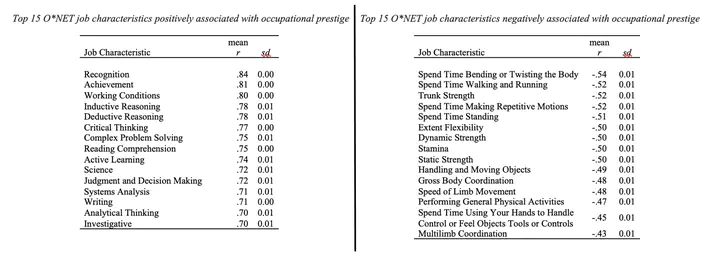
Abstract
The relationship between life outcomes and an individual’s standing in the social and economic hierarchy of society is an important topic across the social sciences. Foundational to this work is assessing an individual’s standing in this hierarchy, often referred to as socioeconomic status (SES) . One component of an individual’s SES, often overlooked in the psychological literature, is occupational prestige – the amount of status accorded to them based on their occupational role. In this research, we collected and validated a new index of occupational prestige for 1029 specific occupations, including all jobs in the US Department of Labor’s O*NET database, and 22 broader occupational families. In Study 1, we collected a comprehensive set of occupational prestige ratings, and demonstrated their high reliability. In Study 2, we developed a crosswalk between the ratings collected in Study 1 and prior ratings of occupations listed in the US Census and show convergent validity with previous indices. In Studies 3 and 4 we used additional data to evaluate the construct validity of occupational prestige more broadly. In Study 3, we established convergent and discriminant validity with other indicators of SES, income and educational attainment. In Study 4, we use the O*NET database to identify the characteristics of occupations most strongly associated with prestige. These results support the validity of the index and suggest occupations with high prestige require skills traditionally emphasized in liberal arts education (e.g., critical thinking, reading comprehension).
Supplementary notes can be added here, including code and math.